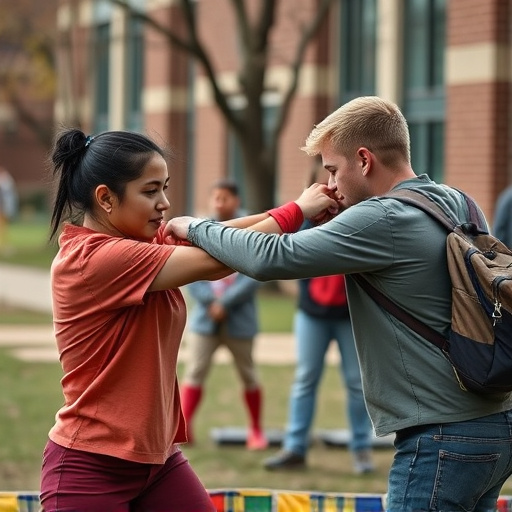College students face unique security challenges on campus, requiring them to prioritize self-defense skills. Understanding potential dangers like isolated areas and online threats is key. Learning legal rights and responsibilities ensures safe usage of force. Practical techniques, including de-escalation and quick strikes, enhance personal safety. Many colleges offer specialized self-defense classes and resources, empowering students with essential knowledge for their academic journey.
College life presents unique challenges, including potential safety concerns. Understanding the importance of self-defense is crucial for empowering students to navigate their campus securely. This article explores various aspects of self-defense for college students, from recognizing common threats and legal rights to mastering practical techniques and accessing training resources. By equipping ourselves with knowledge and skills, we can actively contribute to our safety in academic environments.
Understanding the Importance of Self-Defense for College Students
For college students, understanding and prioritizing self-defense is paramount. The transition from high school to college often involves living independently for the first time, which means being responsible for one’s safety. College campuses, despite being vibrant and bustling communities, can present unique challenges, from navigating dark alleys late at night to dealing with unexpected situations in isolated areas. Therefore, equipping oneself with self-defense knowledge and skills is not just advisable but essential for personal security.
Many students might overlook the potential risks or assume that campus safety measures are adequate, but being prepared for any eventuality can make all the difference. Self-defense classes, for instance, teach valuable techniques to deter or escape from attackers, boost confidence, and foster a sense of empowerment. In today’s digital era, where awareness about personal safety is increasingly important, self-defense becomes an integral part of college life, ensuring that students feel secure while navigating their academic and social environments.
Common Threats and Risks on College Campuses
College campuses, despite being hubs of learning and growth, can present unique challenges for students’ safety, especially regarding personal security. Self-defense for college students is a vital skill to acquire, as they often navigate unfamiliar environments, late-night walks, and social gatherings, which may increase their exposure to potential risks. Understanding common threats is the first step in empowering students to take charge of their well-being.
These risks include, but are not limited to, isolated areas with poor lighting, where muggings or assaults might occur; crowded spaces that could facilitate the spread of dangerous substances like drugs or acid; and even online threats, as cyberbullying and stalking can leave students vulnerable. Moreover, navigating social situations, especially in new environments, may create opportunities for predators to exploit the naivety of freshmen. Learning self-defense strategies, such as awareness, prevention, and physical techniques, equips students with the tools to navigate these scenarios confidently and safely.
Legal Aspects: Rights and Responsibilities of College Students
In many jurisdictions, college students have specific legal rights and responsibilities when it comes to self-defense. Understanding these aspects is crucial for personal safety on campus. Students should be aware that they have the right to protect themselves from imminent harm, which includes using reasonable force to defend against attacks. This means that if a student believes their life or well-being is in danger, they can respond with physical force to deter or stop an assault. However, the level of force allowed varies by location and situation; students must act within legal boundaries to avoid any repercussions.
Knowing one’s rights also involves understanding responsibilities. College students are expected to use self-defense as a last resort when other de-escalation methods have failed. They should be trained in basic self-defense techniques and encouraged to report any incidents or suspicious activities to campus security or local authorities. By being proactive and informed, students can better navigate the legal aspects of self-defense for college students while ensuring their safety on campus.
Practical Self-Defense Techniques for Everyday Situations
Learning practical self-defense techniques is an essential skill for college students, as it can provide them with the confidence and knowledge to navigate potentially dangerous situations. Beyond basic training, focusing on everyday scenarios is crucial for self-defense preparation. For instance, teaching students how to de-escalate conflicts through assertive communication and body language can prevent physical altercations from escalating. Practicing quick and effective strikes against various targets, such as pressure points and vulnerable areas, enables individuals to defend themselves in close-quarters encounters.
College campuses often present unique challenges, including crowded spaces and late-night walks. Training students to be aware of their surroundings, identify potential threats, and respond swiftly can significantly enhance their safety. Incorporating mobility drills and escape strategies into self-defense education empowers students to move away from dangerous situations, providing them with a layer of protection in unfamiliar or high-risk environments.
Resources and Training Options for Enhanced Safety
Many colleges offer resources and training programs tailored to enhance self-defense capabilities among their student bodies, addressing the unique challenges that come with campus life. These initiatives are a significant step towards empowering students and ensuring their safety within the confines of the college environment. One such resource is dedicated self-defense classes, often led by certified instructors who provide hands-on training in various techniques, from basic blocks and strikes to more advanced strategies for escaping gripping situations.
Additionally, campus security departments frequently organize workshops and seminars covering personal safety measures, risk assessment, and awareness. These sessions may include topics such as identifying potential threats, navigating dark areas, using everyday objects as self-defense tools, and effective communication with authority figures. Utilizing these available resources is a proactive step for college students to gain confidence in their ability to protect themselves while also fostering a sense of community engagement in safety initiatives.
